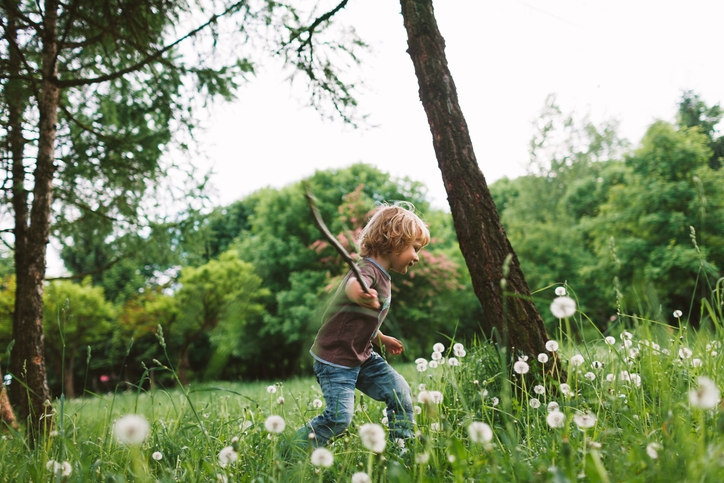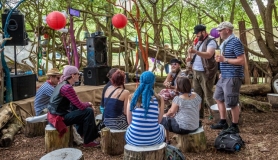I grew up in the sort of household where time was accounted for more assiduously than money. The, “So what did you do today?” that greets so many children when they get home from school was a loaded question in my family at least. It meant “What did you learn?”; “What did you achieve?”, in just the same way that “Who did you play with at playtime?” was a code for the anxious “You do have friends, don’t you? You do have the right sort of friends?” When I wasn’t in school, I was practising the piano, practising the violin, doing ballet summer school, learning to type, writing poems, doing calligraphy, reading books – all very rewarding activities, and ones which I enjoyed (some of them enrich my life still) but I was left with little sense of who I might be when I wasn’t doing quite so much. Many years later, I became Jewish and discovered a concept I had never really come across before – the concept of the Sabbath: fallow time.
Taking time out
We all know that intensive farming sooner or later destroys the land it uses because it is precisely that – too intensive. And we all pay lip service to the knowledge that the over-intensity of modern life with its excessive demands destroys the delicate balance that enables our bodies and lives to hang together in health. But how many of us actually take time out? We may relax, certainly, but how many of our forms of “relaxation” are actually regenerating? We go away for the weekend. But that requires hours of travel with all the stress that that entails. We go to the gym, or to the swimming pool, but those are noisy, brightly-lit places. We talk to friends on the phone, or via e-mail but did you ever stop to notice how much more energy it takes to talk to someone you can’t see (and whose body language you can’t read) than it does to be with someone in “real time”? When was the last time you hugged someone over the internet? Or shared an accepting silence over the telephone?
The Sabbath
Our family does the Sabbath. (The Yiddish is “making the sabbath” – which I like – it respects the fact that each Sabbath is something “homemade”, something different from the one before and the one after. Our family’s Sabbath is different from yours, because we are different (just like my banana cake is different from my mother’s, even though we use the same recipe). So I’d like to share some ideas with you – some will resonate, some won’t. That’s OK. I can’t get offended, they’re not my ideas. Like the best ideas they’re very old. So, to make a Sabbath, first put away the car, the bicycle, the travelcard. The weekend has two days; whenever you decide to observe your Sabbath, it’s the other day that becomes the one for visiting friends and relations. The Sabbath is about where you are, not where you want to be. It’s about who you’re with, not who you think you might like to be with. Next, switch off the television, the computer and the telephone. The television because there is nothing more sure to shut down conversation than having a television on in the room – nothing better designed to ensure that your children won’t spend time with you than giving them the option of spending it in the fantasy-world of TV. The computer because it makes everything seem terribly urgent – you just have to check your e-mail NOW, look up this piece of information NOW. On a Sabbath, nothing is urgent – you have (until it ends) all the time in the world. The telephone (yes, it’s the hardest) has to go, not only because it too takes your focus away from where you are and who you are actually with, but because (and this is the very thing that makes it the most difficult to drop) we are addicted to the notion that that emergency telephone call is just about to come through, and we are the only people that could possibly deal with that call. For 24 hours a week, it’s good to remind ourselves that actually, the world can continue perfectly well without our participation. Yes, our friends and our extended family need us, but 999 times out of 1,000, they don’t need to speak to us RIGHT NOW. In our eight years of being Sabbath-observant, all the times the telephone has rung and we have ignored it, worrying all the time that it might be some emergency situation, it has turned out, at the end of the day, only to have been telesales, or a wrong number. For quite a few weeks, your friends and family will be annoyed at you setting bounds on the times they can call. But then, my mother-in-law is still quite annoyed at being asked not to call during the children’s bath-, story- and bed-time. As a family, we love our friends, grandparents, aunts and uncles. But we’re only able to be there for them because we’re here for each other first. If our family is going to survive, there has to be time when it’s quite clear it’s “just family”. Finally, put away the wallet, purse and credit cards. The Jewish Sabbath is meant to recall two things – first the creation of the universe, which is why it’s a good time just to sit back and be close to nature. We don’t do gardening, even though it’s a great, earthy activity which as a family we enjoy, because it’s a day to appreciate what is, rather than to try to improve it and create something “new”. And secondly, it recalls the Jewish people’s liberation from slavery in Egypt. That means it’s a day when we don’t focus on where we are in the economic scale of society. We’re not meant to be worrying about what we can or cannot afford to buy. We’re not meant to be judging ourselves or others by the standards of economic or social success. Of course, it would be good not to be judging by those standards on any day of the week, but like all ideals, sometimes you have to start small. One of the benefits of the Sabbath, in fact, is that if we start seeing the world differently one day a week, that different vision tends to spread into the rest of the week. If for one day we focus on what is important, then even if that temporarily gets lost in the stresses of work, or running the children round to different activities, we never quite lose sight of that important value even if it is shoved to the back of our minds. So much for the negatives. In fact, the negatives – the things that we refrain from doing – are in many ways more important in defining the Sabbath than the things we do do. I’ve called this article “fallow time”, and what is important about “fallow” is actually leaving be. What will grow will grow. It’s important not to be too prescriptive. However, all that empty time has to be filled with something, so here are some ideas.
Lighting Candles
The first thing the Jewish household does to usher in the Sabbath is to light a pair of candles. The Sabbath, then, becomes a time of gentle light. Not a time of not-seeing, but a time of seeing everything, and most importantly one another, in a light that is not harsh. After candle-lighting, we sing some songs to welcome the Sabbath, to celebrate having reached the end of the week and to make the transition to accepting everything that has happened in the last week, both good and bad. (One of the last things I do personally before the Sabbath is to call my “professional buddy” and run through the things we did and didn’t manage to get done during the week, and think about how we might be more efficient next week. That helps us both to “lay the week to rest”.) Then we eat a festive meal, trying to make sure that everyone has something on the table that is a particular favourite for them so that everyone feels equally special and important. There are blessings to say over the Sabbath bread (which I home-bake with my two daughters during the day) and wine (or grape juice). Stopping to make those blessings helps us appreciate the food more: we might have made it, or bought it; in some cases we have even grown it, but we are far from being fully responsible for the earth’s bounty.
Friends and relatives We often have guests for one or other of the Sabbath meals (though unless we have visitors who are staying over we tend to try to keep at least one meal for “just us”). Focussing on our own family is important, but so is feeling part of the community. Actually, many of our local friends know that the Sabbath is a time they can just drop by and find us at home – and they do, thus recapturing something of the spirit of those times gone by when neighbours did just drop in for a cuppa, and arrangements didn’t have to be made a month in advance or by a long series of telephone messages left on an answerphone. Our meals are long, and we talk about all those things you never get a chance to talk about unless you are together for long periods of time with nothing particular to do. No one jumps up from the table. The children trail off to bed as and when they get tired, and it’s generally just the adults who get to dessert.
Reading and discussion Traditionally the next day there are prayers and a reading from the weekly Bible portion. For your own Sabbath, you could replace this with any kind of activity which brings family or local community together to think about the things that are most important to you. It’s a time for transmitting our most precious values to our children; for discussion, for reading, for answering questions. And also a time for creating some personal space: my husband and I take it in turns to pray, or sometimes just to think, or sit quietly. After another meal, it’s time for a sleep (the Sabbath is the only day when we all, invariably, get an afternoon nap). This isn’t time wasted – by sleeping on the Sabbath we acknowledge that sleep, like food, is a gift. It’s important. So often we are fighting against tiredness. But getting tired is part of being human. It’s something to be embraced. Whatever the weather, we almost always get out for a walk at some point. It’s a dawdling kind of a walk in which everyone gets to stop and smell the flowers. The children often get to go to the park; I go out and watch the sun set.
Time well spent If all this doesn’t sound like very much (and certainly nothing very exciting) then that’s probably right. Above all, the Sabbath is for not doing anything we normally consider important. My mother would probably say it’s time wasted. But it’s in those in-between times that we sometimes discover exactly what it is we should be spending the rest of the week doing. And that nurtures lives that are far from wasted.







